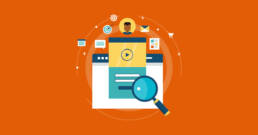
Why Data Ethics Are Key to User Engagement

May 12, 2022
share this post
No doubt, you know the creepy clothing ads that follow you online after you search for or purchase, say, a new pair of pants or shirt.
All of a sudden, similar shirts pop up when you’re reading the news, conducting research for work, or even registering your kids for summer camp.
The gathering and use of data raises a variety of ethical concerns that companies and organizations are only beginning to consider and sort out. After all, just because you can gather and use data doesn’t mean you should. What are your intentions with the data you gather, and how does it help (or hinder) the user experience?
A 2019 report from the Pew Research Center reveals that 79 percent of adults in the United States are concerned with how private companies use their data, while 64 percent are concerned with government uses of data. Large majorities also say they don’t understand how companies and government entities use data—and even if they did know, they don’t believe they can do anything about it.
Perhaps the biggest takeaway from this Pew study, however, is what it says about users’ perceptions of benefits and risks. According to the study, as many as 81 percent believe the risks of sharing personal information outweigh the benefits. Put another way, users see more negatives than positives. They’re sharing information and having their behaviors and actions tracked and fed to algorithms, but they’re not gaining much, if anything, from the experience.
In this Wild West of data collection, in which the rules and regulations continue to shift, how can you use data in ways that help you grow your business, without turning away your customers and clients? How can you define and adhere to your own set of ethical standards, in an area that lacks clear boundaries between right and wrong, and when your competitors create and follow rules of their own?
1. Take a comprehensive approach.
When it comes to data, presenting yourself as trustworthy to your clients and customers starts with a comprehensive understanding of the meaning of “data ethics.” Many people think it involves nothing more than asking for consent. That’s part of it, but adhering to data ethics involves far more.
Luciano Floridi, a professor of philosophy and information ethics at Oxford University, defines data ethics as “a branch of ethics that deals with the moral problems related to data during its phases of processing, curation, sharing, dissemination, generation, recording, and correspondence.” Floridi’s definition encompasses many broad components—and means, for example, that if you’re in the business of data gathering, then you must also be in the business of keeping the data you gather out of harm’s way. This means protecting data from hackers and other businesses who do not have permission to use it or may use it in an unethical (and even illegal) way.
2. Be transparent.
Anytime you ask for data, explain in clear terms exactly how you will use it. Only then can users make informed decisions about whether to share information. Likewise, if your website tracks users’ behavior with cookies, then users have a right to know how you will use and store the data—and even how, for instance, your algorithms will use the data to customize experiences for users.
Data transparency involves more than a few lines of copy alerting users at the sign-up point. Often, it involves ongoing communication to keep users updated and informed as your practices and intentions evolve. In 2019, Microsoft, for instance, crafted and shared with customers this detailed account of steps they took to boost transparency around issues relating to data, including the decision to categorize data fields as required versus optional for users—and to explain their rationale.
Microsoft’s account represents a strong example of the kind of communication needed to build trust and transparency with data, yet it falls short in that it was written and released in reaction to accusations of the company mishandling personal data. A more proactive approach would have been to get ahead of the criticism by keeping customers and clients informed on an ongoing basis. For example, by making “data privacy” an ongoing topic in your editorial calendar or adding a “data privacy update” column to your newsletter, you can stay in front of the criticism and assuage concerns before they fester.
3. Stay attuned to GDPR and emerging regulations.
GDPR refers to the General Data Protection Regulation passed and put into effect by the European Union (EU) in 2018. Though created in the EU, it applies to any company or organization that collects data from EU residents.
You can read the lengthy, dense regulation in its entirety, but we recommend working with a partner who understands the ins and outs of GDPR and can ensure that you comply. We also recommend crash courses and cheat sheets—and singling out what applies to you. For instance, if you are a small or mid-sized business, read the guide created specifically for organizations of your stature. Likewise, see the GDPR compliance checklist for U.S. companies.
Keep in mind, too, as the global business world adjusts to new technologies that make possible the onslaught of data, regulations and guidelines will remain ever-shifting. For this reason, staying updated and informed will be key to staying ethical. Dataversity and The Alan Turing Institute put out highly researched, credible, and forward-thinking information on these topics—and are two we stay attuned to regularly.
4. Remember the user experience.
One of the best ways to improve the user experience is through personalization. Yet personalization takes data—a lot of it. And there is a thin line between personalization done well and personalization done to your organization’s detriment. As your organization or association strategizes ways to get the data you need, don’t forget about the user experience. Remember, too, that users don’t want to stop and enter information at every turn.
“Your customers are willing to engage and share their data if they perceive a real benefit for them,” advises an article from the Wharton School at the University of Pennsylvania. Wharton experts say to ask for data and information sparingly—and strategically—to avoid overdoing it and to examine the request for data from a user’s perspective: Why should I take the time to enter this? What will this give me in return?
When used strategically and ethically, data can give your organization what it needs to attract and engage audiences, while improving the user experience and growing your business. But it can’t be approached or utilized haphazardly.
If you need guidance collecting and using data in ways that build trust and credibility, while helping you achieve business goals, our team at Astriata can help. We offer a full suite of services in UX website design and development, CMS implementation, usability testing, and data-based marketing. Reach out to start the conversation.